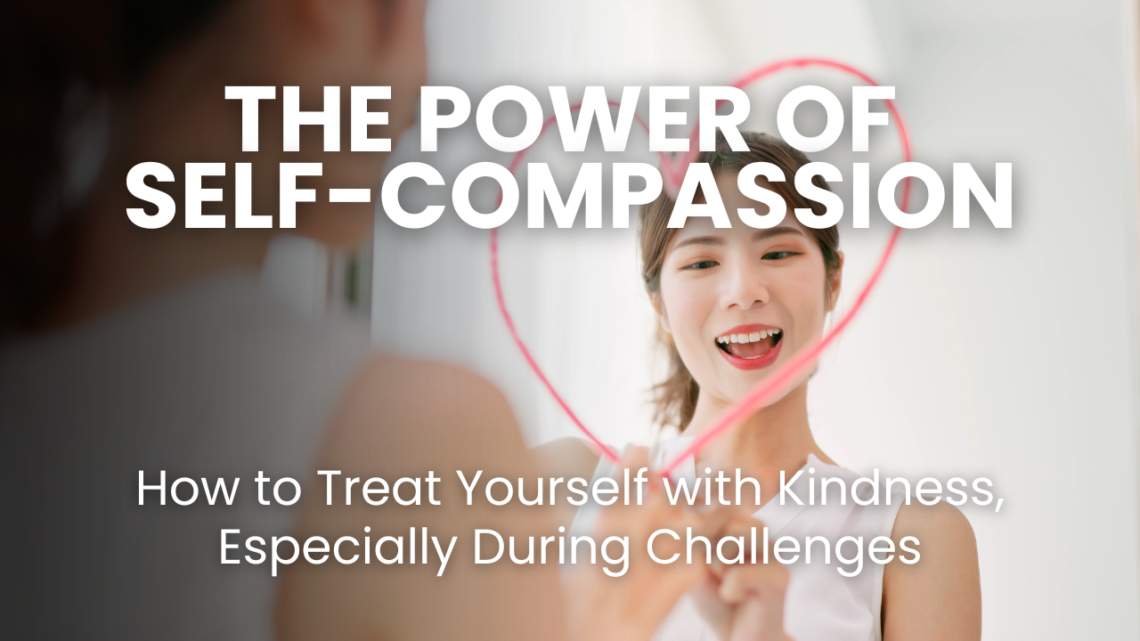Life is a rollercoaster. We experience exhilarating highs, but we also inevitably face challenging lows. During these difficult times, it’s easy to fall into a trap of self-criticism, berating ourselves for perceived failures or shortcomings. However, there’s a powerful antidote to this negativity: self-compassion. This isn’t about self-indulgence or letting yourself off the hook; it’s about treating yourself with the same kindness, care, and understanding you would offer a dear friend struggling with similar difficulties. This blog post will explore the profound importance of self-compassion for building resilience, fostering well-being, and navigating life’s inevitable storms with greater ease and grace.
What is Self-Compassion? Moving Beyond Self-Esteem

Self-compassion, while often confused with self-esteem, offers a fundamentally different approach to navigating life’s ups and downs. It’s not about constantly striving for external validation or measuring our worth based on achievements. Instead, it’s about cultivating an internal reservoir of kindness and understanding that we can draw upon regardless of our circumstances. This distinction is crucial because self-esteem, being contingent on external factors, can be fragile and easily shattered by setbacks or criticism. Self-compassion, on the other hand, provides a stable foundation for well-being, allowing us to weather life’s storms with greater resilience.
Here’s a more detailed look at the nuances of self-compassion and how it differs from self-esteem:
The Fragility of Self-Esteem:
Self-esteem is often built on a conditional foundation. We feel good about ourselves when we achieve certain goals, receive praise from others, or meet societal expectations. However, this external validation is fleeting and unreliable. When we inevitably face failures, criticism, or setbacks, our self-esteem can plummet, leaving us feeling vulnerable and inadequate. This constant need for external affirmation can lead to anxiety, insecurity, and a fear of failure. It can also drive us to seek validation in unhealthy ways, such as people-pleasing or perfectionism.
The Steadfastness of Self-Compassion:
Self-compassion offers a more secure and sustainable path to well-being. It’s not about judging ourselves based on external standards; it’s about accepting ourselves unconditionally, including our imperfections and struggles. This acceptance doesn’t mean we’re complacent or that we don’t strive to grow and improve. It simply means that we recognize our inherent worth as human beings, regardless of our accomplishments or shortcomings. This inner sense of worth provides a buffer against negative experiences, allowing us to learn from our mistakes without being consumed by self-criticism.
Beyond Feeling Good: The True Nature of Self-Compassion:
Self-compassion isn’t just about feeling good about ourselves; it’s a deeper and more nuanced approach to life. It involves recognizing and accepting our full range of human emotions, both positive and negative, without judgment. It’s about acknowledging our suffering and responding to it with kindness and understanding, just as we would offer comfort to a friend who is struggling. This doesn’t mean wallowing in self-pity; it means acknowledging our pain without getting carried away by it and recognizing that suffering is a universal human experience.
Self-Compassion as a Skill:
Unlike self-esteem, which can feel elusive and dependent on external factors, self-compassion is a skill that can be cultivated and strengthened through practice. It’s about learning to quiet the inner critic, recognize our shared humanity, and respond to ourselves with kindness and understanding. Just like any other skill, it takes time and effort to develop self-compassion, but the rewards are immense.
The Interplay of Self-Compassion and Self-Esteem:
While distinct, self-compassion and self-esteem can influence each other. As we cultivate self-compassion, we may naturally experience a boost in self-esteem. However, this increase in self-esteem is a byproduct of self-compassion, not the primary goal. When our self-esteem is grounded in self-compassion, it becomes more stable and less dependent on external validation. This allows us to experience greater emotional well-being and navigate life’s challenges with greater ease and resilience.
Moving Beyond the Conditioned Self:
Self-compassion invites us to move beyond the conditioned self, the self that is constantly striving for approval and measuring its worth based on external standards. It allows us to connect with our authentic selves, the selves that are worthy of love and compassion simply because we are human. This connection to our authentic selves provides a deep sense of belonging and connection to something larger than ourselves.
In essence, self-compassion offers a more profound and sustainable path to well-being than self-esteem. It’s about embracing our humanity, with all its imperfections and struggles, and treating ourselves with the same kindness and understanding that we would offer a dear friend. This shift in perspective can be transformative, leading to greater resilience, emotional stability, and a deeper sense of self-acceptance.
Why is Self-Compassion Important? The Benefits for Well-being

Self-compassion isn’t just a nice idea; it’s a powerful force that can significantly impact our mental, emotional, and even physical well-being. It’s not about indulging in self-pity or avoiding difficult emotions; it’s about creating a supportive inner environment that allows us to thrive, even in the face of adversity. The benefits of cultivating self-compassion are far-reaching and supported by a growing body of research. Let’s explore these benefits in more detail:
Beyond Feeling Better: A Foundation for Thriving:
While feeling better is certainly a welcome outcome of self-compassion, its impact goes far beyond simply improving our mood. It creates a fundamental shift in how we relate to ourselves and the world around us, fostering a sense of inner resilience that allows us to navigate life’s challenges with greater ease and effectiveness.
The Ripple Effect on Mental and Emotional Health:
- Buffering Against Stress: Self-compassion acts as a buffer against the negative effects of stress. When we’re kind to ourselves during stressful times, we’re less likely to become overwhelmed by negative emotions and more able to cope effectively. This can reduce the risk of stress-related illnesses, both physical and mental.
- Diminishing Rumination: We all have a tendency to ruminate on our mistakes and shortcomings. Self-compassion helps to quiet this inner critic, reducing the amount of time we spend dwelling on negative thoughts. This frees up mental energy for more productive and positive pursuits.
- Reducing Shame and Self-Blame: Shame and self-blame can be incredibly toxic emotions, leading to feelings of worthlessness and isolation. Self-compassion helps us to recognize that everyone makes mistakes and that we’re not alone in our struggles. This reduces feelings of shame and allows us to learn from our experiences without being consumed by self-criticism.
- Promoting Emotional Regulation: Self-compassion allows us to experience our emotions, both positive and negative, without judgment. This acceptance of our emotional landscape leads to greater emotional stability and reduces the likelihood of emotional outbursts or suppression.
- Fostering Self-Acceptance: At its core, self-compassion is about accepting ourselves unconditionally, including our imperfections and vulnerabilities. This self-acceptance is a cornerstone of mental well-being, allowing us to embrace who we are without constantly striving for an unattainable ideal.
The Impact on Behavior and Relationships:
- Enhancing Motivation: It might seem counterintuitive, but self-compassion can actually boost motivation. When we’re not afraid of failure, we’re more likely to take risks and pursue our goals. Self-compassion provides a safe space for us to learn and grow, even when we make mistakes.
- Improving Relationships: When we’re kind to ourselves, we’re more likely to be kind to others. Self-compassion fosters empathy and understanding, which can improve our relationships with family, friends, and colleagues. It also helps us to set healthy boundaries and avoid codependent patterns.
- Promoting Healthier Habits: Self-compassion can motivate us to take better care of ourselves, both physically and mentally. When we value ourselves, we’re more likely to engage in healthy behaviors, such as eating nutritious food, exercising regularly, and getting enough sleep.
Beyond the Individual: A Societal Shift:
The benefits of self-compassion extend beyond the individual. As more people cultivate self-compassion, it can create a ripple effect, fostering greater compassion and understanding in our communities and society as a whole. A world where people are kinder to themselves is likely to be a more compassionate and just world.
A Foundation for Growth and Resilience:
Ultimately, self-compassion provides a strong foundation for personal growth and resilience. It allows us to learn from our experiences, overcome challenges, and thrive in the face of adversity. It’s not about being soft on ourselves; it’s about being strong enough to embrace our humanity and treat ourselves with the kindness and understanding we deserve.
How to Cultivate Self-Compassion: Practical Exercises and Techniques

Cultivating self-compassion isn’t an overnight transformation; it’s a journey of consistent practice and gentle self-exploration. Just like learning any new skill, it requires patience, persistence, and a willingness to be kind to yourself along the way. Here’s a more detailed exploration of practical exercises and techniques to help you nurture self-compassion in your daily life:
Moving Beyond Theory: Embodied Practices:
While understanding the theory of self-compassion is important, the real transformation happens through embodied practices. These practices help us to move beyond intellectual understanding and connect with the felt sense of self-compassion in our bodies and emotions.
Formal Practices for Deepening Self-Compassion:
- The Self-Compassion Break: This short, structured practice is a great way to introduce self-compassion into your daily routine. When you’re feeling stressed or overwhelmed, take a few minutes to:
- Acknowledge your suffering: Recognize and name the difficult emotion you’re experiencing. Say to yourself, “This is really hard,” or “I’m feeling anxious.”
- Recognize your common humanity: Remind yourself that suffering is a part of the human experience. Say to yourself, “Everyone struggles at times,” or “I’m not alone in this.”
- Offer yourself kindness: Place your hand on your heart and offer yourself words of comfort and support. Say to yourself, “May I be kind to myself,” or “May I accept myself as I am.”
- Common Humanity Meditation: This meditation involves reflecting on the shared human experience of suffering. It helps us to recognize that we’re all imperfect and that we all struggle at times. You can find guided common humanity meditations online or create your own by focusing on the universality of pain, imperfection, and the desire for happiness.
- Loving-Kindness Meditation: This practice involves directing feelings of loving-kindness towards yourself and others. It can be particularly helpful for cultivating self-compassion by starting with yourself. Begin by repeating phrases of loving-kindness, such as “May I be well,” “May I be peaceful and at ease,” and “May I be happy,” while visualizing yourself and feeling the warmth of compassion.
- Mindful Self-Compassion Practices: These practices combine mindfulness with self-compassion. They involve paying attention to your thoughts and feelings without judgment, while also offering yourself kindness and understanding. You can incorporate mindful self-compassion into your meditation practice, journaling, or even everyday activities like walking or eating.
Informal Practices for Everyday Moments:
- Mindful Moments: Bring mindful awareness to everyday activities, such as brushing your teeth, taking a shower, or eating a meal. Pay attention to your senses and appreciate the present moment. This can help to quiet the inner critic and cultivate a sense of presence.
- Compassionate Self-Talk: Pay attention to the way you talk to yourself. Are your words kind and supportive, or are they harsh and critical? Make a conscious effort to replace negative self-talk with compassionate and encouraging words.
- Self-Care as an Act of Self-Compassion: Engage in activities that nourish your body, mind, and spirit. This could include taking a relaxing bath, spending time in nature, listening to music, or pursuing a hobby. Self-care is not selfish; it’s an essential aspect of self-compassion.
- Treating Yourself Like a Friend: Imagine a dear friend is going through the same challenge you’re facing. What would you say to them? How would you offer them comfort and support? Then, offer yourself the same kindness and understanding.
- Journaling for Self-Compassion: Use journaling as a way to explore your thoughts and feelings with self-compassion. Write about your struggles, your strengths, and your hopes for the future. Be honest with yourself, but also be kind and gentle.
- Compassionate Touch: Physical touch can be a powerful way to express self-compassion. Try placing your hand on your heart, giving yourself a gentle hug, or massaging your shoulders.
Overcoming Obstacles to Practice:
- Time Constraints: Even short bursts of self-compassion practice can be beneficial. Start with a few minutes each day and gradually increase the duration as you become more comfortable.
- Resistance to Self-Kindness: Some people may find it difficult to be kind to themselves, especially if they’ve been highly self-critical for a long time. Start small and be patient with yourself. Even a little bit of self-compassion is better than none.
- Discomfort with Emotions: Self-compassion involves acknowledging and accepting our emotions, which can be uncomfortable at times. Remember that it’s okay to feel difficult emotions. Allow yourself to experience them without judgment and offer yourself comfort and support.
Making it a Habit:
The key to cultivating self-compassion is consistency. Make it a habit to incorporate self-compassion practices into your daily routine. The more you practice, the more natural and effortless it will become. Remember that self-compassion is not a destination; it’s a journey of ongoing practice and self-discovery. Be kind to yourself along the way, and celebrate your progress, no matter how small.
Self-Compassion and Resilience: Bouncing Back from Adversity

Resilience, the ability to bounce back from adversity, isn’t about being invulnerable to life’s challenges. It’s about having the inner resources to navigate difficult experiences, learn from them, and emerge stronger on the other side. Self-compassion plays a crucial role in fostering resilience by providing us with the emotional support and understanding we need to cope effectively during tough times. It’s not about avoiding pain or pretending everything is okay; it’s about meeting our struggles with kindness, acknowledging our shared humanity, and maintaining a balanced perspective.
The Intertwined Nature of Self-Compassion and Resilience:
Self-compassion acts as a powerful internal resource that bolsters our resilience in several key ways:
- Emotional First Aid: When we’re facing a difficult situation, self-compassion provides immediate emotional first aid. Instead of berating ourselves for our struggles, we offer ourselves comfort and support, just as we would a friend in need. This helps to regulate our emotions and prevent us from becoming overwhelmed by negative feelings.
- Reframing Challenges: Self-compassion helps us to reframe our challenges. Instead of viewing setbacks as personal failures, we recognize that everyone makes mistakes and experiences difficulties. This broader perspective allows us to learn from our experiences without getting bogged down by self-blame.
- Maintaining Perspective: Adversity can often feel all-consuming, making it difficult to see beyond the immediate pain. Self-compassion helps us to maintain perspective by reminding us that this difficult time is temporary and that we have the inner resources to cope.
- Fueling Motivation: It might seem counterintuitive, but self-compassion can actually fuel our motivation to overcome challenges. When we’re not afraid of failure, we’re more likely to take risks, try new things, and persevere in the face of setbacks. Self-compassion provides a safe space for us to learn and grow, even when we make mistakes.
- Building Emotional Strength: Just like physical exercise strengthens our muscles, navigating challenges with self-compassion builds our emotional strength. Each time we meet a difficult situation with kindness and understanding, we become more resilient and better equipped to handle future adversity.
How Self-Compassion Enhances Specific Aspects of Resilience:
- Acceptance: Self-compassion helps us to accept the reality of our situation, even if it’s not what we wanted. This acceptance is not about giving up; it’s about acknowledging what is and focusing our energy on what we can control.
- Adaptability: Resilience requires adaptability, the ability to adjust to changing circumstances. Self-compassion helps us to be more flexible and open to new possibilities, even when things don’t go as planned.
- Optimism: While self-compassion doesn’t guarantee a positive outcome, it does help us to maintain a sense of hope and optimism. It reminds us that we’re capable of overcoming challenges and that things will eventually get better.
- Self-Efficacy: Self-efficacy is the belief in our ability to succeed. Self-compassion helps to build self-efficacy by reminding us of our strengths and past successes. It also encourages us to take action, even when we’re feeling uncertain.
- Social Support: Resilient individuals often have strong social support networks. Self-compassion can help us to cultivate and maintain healthy relationships by fostering empathy and understanding. It also makes us more likely to seek help when we need it.
Practical Ways to Cultivate Self-Compassion During Difficult Times:
- Acknowledge and Validate Your Pain: Don’t try to suppress or ignore your pain. Acknowledge it and validate your feelings. It’s okay to feel sad, angry, or scared.
- Remember Your Shared Humanity: Remind yourself that you’re not alone in your struggles. Everyone experiences difficulties at some point in their lives.
- Offer Yourself Comfort and Support: Treat yourself with the same kindness and understanding that you would offer a friend who is going through a tough time.
- Focus on What You Can Control: Instead of dwelling on things you can’t change, focus your energy on what you can control. This can help you to feel more empowered and less overwhelmed.
- Practice Self-Care: Make sure you’re taking care of your physical and emotional needs. Get enough sleep, eat nutritious food, and engage in activities that bring you joy and relaxation.
- Seek Support: Don’t hesitate to reach out to friends, family, or a therapist for support. Talking about your struggles can be incredibly helpful.
Resilience as a Skill, Not a Trait:
It’s important to remember that resilience is not an innate trait; it’s a skill that can be developed and strengthened over time. By cultivating self-compassion, we can build our resilience and become better equipped to navigate the inevitable challenges of life. It’s a journey of learning, growing, and becoming more compassionate towards ourselves and others.
Overcoming Obstacles to Self-Compassion: Addressing Common Misconceptions

Self-compassion, while a seemingly simple concept, can be surprisingly challenging to embrace. We often carry deeply ingrained beliefs about self-worth, vulnerability, and the nature of kindness that can create obstacles to practicing self-compassion. Addressing these common misconceptions is crucial for unlocking the transformative power of self-compassion.
Misconception 1: Self-Compassion is Self-Indulgence or Laziness:
This is perhaps the most prevalent misconception. Many fear that being kind to themselves will lead to complacency, lack of motivation, or a slippery slope into self-pity. The truth is quite the opposite. Self-compassion isn’t about letting yourself off the hook; it’s about creating a supportive inner environment that allows you to learn from your mistakes and grow without being crippled by self-criticism. It’s about recognizing that everyone struggles and that setbacks are a natural part of the learning process. Self-compassion actually enhances motivation by reducing the fear of failure, allowing you to take risks and pursue your goals with greater confidence.
Misconception 2: Self-Compassion is Weakness:
In a culture that often glorifies toughness and stoicism, self-compassion can be mistakenly perceived as a sign of weakness. However, it takes considerable strength to face our imperfections and vulnerabilities with kindness and acceptance. It’s much easier to hide behind a facade of perfection or to numb our emotions. Self-compassion requires courage and a willingness to be vulnerable. It’s not about being “soft” on ourselves; it’s about being strong enough to embrace our humanity, flaws and all.
Misconception 3: Self-Compassion is Selfish:
Some believe that focusing on self-compassion is inherently selfish, taking away from our ability to care for others. However, self-compassion is actually a prerequisite for genuine compassion towards others. We cannot truly offer kindness and understanding to others if we are constantly judging and criticizing ourselves. As the saying goes, “You cannot pour from an empty cup.” Self-compassion allows us to fill our own cup, so that we can then overflow with compassion for those around us.
Misconception 4: Self-Compassion Means Ignoring Problems:
Self-compassion is not about pretending that everything is okay or ignoring our problems. It’s about acknowledging our difficulties with kindness and wisdom, and then taking steps to address them. It’s about recognizing that we’re doing the best we can in any given moment, while also being open to growth and improvement. Self-compassion provides the emotional resilience we need to face our challenges head-on, without being overwhelmed by self-doubt or despair.
Misconception 5: I Don’t Deserve Self-Compassion:
This belief often stems from deep-seated feelings of unworthiness or shame. We may believe that we need to earn self-compassion through achievements or perfect behavior. However, self-compassion is not conditional; it’s our birthright. We are all worthy of kindness and understanding, simply because we are human. It’s important to challenge these negative beliefs and recognize our inherent worth.
Misconception 6: Self-Compassion is the Same as Self-Pity:
Self-pity involves dwelling on our misfortunes and feeling sorry for ourselves. It often involves a sense of victimhood and a focus on what we lack. Self-compassion, on the other hand, is about recognizing our shared humanity and offering ourselves kindness and understanding. It’s about acknowledging our pain without getting lost in it, and then taking steps to move forward. Self-compassion is empowering; self-pity is disempowering.
Overcoming these Misconceptions:
The key to overcoming these misconceptions is to educate ourselves about the true nature of self-compassion. Read books, articles, and blog posts on the topic. Listen to podcasts or watch videos by experts in the field. Engage in self-reflection and challenge your own beliefs about self-compassion. Most importantly, be patient and kind to yourself as you explore this new way of relating to yourself. It’s a journey, and it’s okay to stumble along the way. The important thing is to keep practicing and to remember that you are worthy of self-compassion, just as you are.
The Journey of Self-Compassion: A Lifelong Practice

Self-compassion isn’t a destination we arrive at; it’s a journey we embark on, a lifelong practice of cultivating kindness and understanding towards ourselves. Just as physical fitness requires consistent effort, so too does emotional well-being. There will be days when self-compassion comes easily, and there will be days when the inner critic roars louder than ever. The key is to embrace this ongoing process with patience, gentleness, and a willingness to learn and grow.
Understanding the Unfolding Nature of Self-Compassion:
The journey of self-compassion is not linear. It’s a winding path with its own unique twists and turns. There will be times when we feel like we’re making progress, and there will be times when we feel like we’re taking steps backward. This is perfectly normal. The important thing is to keep moving forward, to keep practicing, and to keep reminding ourselves that we are worthy of kindness and understanding, even when we stumble.
Embracing Imperfection and the Inevitable Setbacks:
One of the most important aspects of the self-compassion journey is learning to embrace imperfection. We are all imperfect beings, and we all make mistakes. There will be times when we fall short of our own expectations, when we say or do things we regret, or when we simply feel overwhelmed by life’s challenges. These moments are not failures; they are opportunities for growth and learning. Self-compassion allows us to acknowledge our imperfections without judgment, to learn from our mistakes without self-blame, and to move forward with greater wisdom and understanding.
The Role of Self-Reflection and Awareness:
Self-compassion requires self-reflection and awareness. It’s about paying attention to our inner dialogue, recognizing our emotional patterns, and understanding the root of our self-criticism. This self-awareness allows us to make conscious choices about how we respond to ourselves and our experiences. It empowers us to challenge negative self-talk, to cultivate more compassionate thoughts, and to act in ways that align with our values and our well-being.
Integrating Self-Compassion into Daily Life:
Self-compassion is not something we practice in isolation; it’s something we integrate into our daily lives. It’s about bringing mindful awareness to our thoughts and feelings, treating ourselves with kindness in everyday moments, and making choices that support our well-being. This could involve taking a few minutes each day to practice mindful breathing, engaging in self-care activities, or simply offering ourselves a kind word when we’re feeling down. Small, consistent practices can make a big difference over time.
The Importance of Patience and Persistence:
Cultivating self-compassion takes time and effort. It’s not something that happens overnight. Be patient with yourself and don’t get discouraged if you find yourself slipping back into old patterns of self-criticism. Just keep practicing, keep learning, and keep reminding yourself that you are worthy of kindness and understanding. The journey of self-compassion is a marathon, not a sprint.
Finding Support and Connection:
It can be helpful to connect with others who are also on the self-compassion journey. Sharing our experiences and challenges can help us to feel less alone and more supported. Consider joining a self-compassion group, working with a therapist who specializes in self-compassion, or simply connecting with friends or family members who understand the importance of self-kindness.
Celebrating Progress and Embracing the Process:
As you journey along the path of self-compassion, be sure to celebrate your progress, no matter how small. Acknowledge the times when you were able to offer yourself kindness and understanding, and recognize the positive impact that self-compassion has had on your life. Embrace the process of self-discovery and be open to the ongoing unfolding of your own self-compassion journey. It’s a lifelong practice, and it’s a journey worth taking.
Self-Compassion in Specific Situations: Applying it to Everyday Challenges

Self-compassion isn’t just a theoretical concept; it’s a practical tool that can be applied to a wide range of everyday challenges. By consciously choosing to respond to ourselves with kindness and understanding, we can navigate difficult situations with greater ease and resilience. Here’s a breakdown of how to apply self-compassion in specific scenarios:
Work-Related Challenges:
- Making a Mistake: Instead of berating yourself, acknowledge the mistake without judgment. Ask yourself: “What can I learn from this? How can I prevent it from happening again?” Offer yourself words of encouragement, like “Everyone makes mistakes. I’ll do better next time.”
- Facing Criticism: Criticism can sting, even when it’s constructive. Acknowledge the feedback without immediately internalizing it. Ask yourself: “Is this feedback valid? What can I learn from it?” Remember that your worth is not contingent on external validation.
- Feeling Overwhelmed: When work becomes overwhelming, take a break. Practice mindful breathing or a short meditation. Remind yourself that it’s okay to ask for help and that you don’t have to do everything perfectly.
- Job Insecurity: The fear of job loss can be incredibly stressful. Acknowledge your fear without judgment. Remind yourself of your strengths and accomplishments. Focus on what you can control, such as updating your resume or networking.
Relationship Challenges:
- Arguments with Loved Ones: Disagreements are inevitable in any relationship. After an argument, avoid dwelling on who was right or wrong. Focus on understanding the other person’s perspective and finding a resolution. Offer yourself compassion for any hurt feelings.
- Relationship Breakups: Breakups can be incredibly painful. Allow yourself to grieve the loss of the relationship. Remind yourself that you are worthy of love and that you will heal over time.
- Difficult Conversations: Before engaging in a difficult conversation, take a moment to center yourself. Remind yourself to listen with compassion and to express your needs assertively but kindly.
Health and Well-being Challenges:
- Facing a Health Diagnosis: Receiving a difficult health diagnosis can be overwhelming. Allow yourself to feel the full range of emotions. Seek support from loved ones and healthcare professionals. Focus on what you can control, such as following your treatment plan and practicing self-care.
- Dealing with Chronic Pain: Chronic pain can be physically and emotionally draining. Offer yourself compassion for your suffering. Explore pain management techniques and find ways to cope with the challenges of living with chronic pain.
- Struggling with Mental Health: Mental health challenges are common. Acknowledge your struggles without shame. Seek professional help if needed. Practice self-care activities that support your mental well-being.
Personal Growth Challenges:
- Procrastination: Instead of beating yourself up for procrastinating, try to understand the underlying reasons for your procrastination. Are you feeling overwhelmed? Are you afraid of failure? Offer yourself compassion and break down tasks into smaller, more manageable steps.
- Perfectionism: Perfectionism can be a self-defeating cycle. Recognize that striving for excellence is different from demanding perfection. Embrace your imperfections and celebrate your progress, even if it’s not perfect.
- Fear of Failure: Fear of failure can hold us back from pursuing our goals. Acknowledge your fear without judgment. Remind yourself that everyone fails at times and that failure is an opportunity for growth.
Everyday Annoyances and Frustrations:
- Traffic Jams: Instead of getting angry and frustrated, use the time to listen to music, a podcast, or practice mindful breathing. Remind yourself that getting upset won’t change the situation.
- Long Lines: When faced with a long line, practice patience. Use the time to connect with your thoughts or simply observe the people around you.
- Minor Setbacks: Life is full of minor setbacks. When things don’t go as planned, take a deep breath and offer yourself a moment of self-compassion. Remind yourself that these setbacks are a normal part of life.
Key Principles for Applying Self-Compassion:
- Acknowledge Your Suffering: Don’t try to suppress or ignore your pain. Acknowledge it and allow yourself to feel your emotions.
- Remember Your Shared Humanity: Remind yourself that you’re not alone in your struggles. Everyone experiences difficulties at some point in their lives.
- Offer Yourself Kindness and Understanding: Treat yourself with the same compassion and support that you would offer a friend who is going through a tough time.
By consciously applying these principles of self-compassion to everyday challenges, you can cultivate greater resilience, emotional well-being, and a deeper sense of connection to yourself and others. It’s a practice that requires patience and persistence, but the rewards are immeasurable.
Integrating Self-Compassion into Your Daily Life: Small Steps, Big Impact

Self-compassion isn’t something reserved for moments of crisis; it’s a way of being that can be woven into the fabric of our daily lives. Integrating self-compassion into our routines, even in small ways, can have a significant positive impact on our overall well-being. It’s about cultivating a gentle and supportive inner dialogue that accompanies us throughout the day. Here are practical ways to integrate self-compassion into your daily life:
Morning Rituals:
- Start with Gratitude and Kindness: Before getting out of bed, take a few moments to reflect on what you’re grateful for. Then, offer yourself a kind intention for the day, such as “May I be gentle with myself today” or “May I approach today with kindness and curiosity.”
- Mindful Movement: Incorporate gentle stretching or a short yoga flow into your morning routine. Pay attention to your body and move with kindness and respect for its limitations.
- Compassionate Affirmations: As you get ready for the day, repeat positive affirmations that resonate with you. These could be related to self-acceptance, resilience, or self-worth. Look at yourself in the mirror and say them with conviction.
Throughout the Day:
- Mindful Moments: Weave short moments of mindfulness into your day. This could be as simple as taking a few deep breaths before a meeting, paying attention to the sensation of your feet on the ground as you walk, or savoring the taste of your lunch.
- Compassionate Check-ins: Throughout the day, pause and check in with yourself. How are you feeling physically and emotionally? Are you being kind to yourself? If not, what can you do to offer yourself more support?
- Kind Self-Talk: Pay attention to your inner dialogue. Are your thoughts critical and judgmental, or are they supportive and encouraging? Make a conscious effort to replace negative self-talk with compassionate and understanding words.
- Small Acts of Self-Care: Engage in small acts of self-care throughout the day. This could be as simple as taking a short break to stretch, listening to a favorite song, or enjoying a cup of tea.
- Set Realistic Expectations: Avoid overloading yourself with tasks and responsibilities. Be realistic about what you can accomplish in a given day and prioritize accordingly. It’s okay to say no to things that will overwhelm you.
- Acknowledge Your Efforts: Take time to acknowledge your efforts and accomplishments, no matter how small. Celebrate your wins and recognize the progress you’re making.
Evening Reflections:
- Reflect with Kindness: At the end of the day, take some time to reflect on your experiences. What went well? What could have been better? Approach your reflections with kindness and understanding, focusing on what you can learn from your experiences.
- Compassionate Journaling: Use journaling as a way to process your thoughts and feelings with self-compassion. Write about your struggles, your strengths, and your hopes for the future.
- Gratitude Practice: Reflect on what you’re grateful for from the day. This could be anything from a kind interaction with a colleague to a beautiful sunset. Gratitude helps to shift your focus towards the positive aspects of your life.
- Prepare for Rest with Self-Compassion: As you wind down for the evening, engage in relaxing activities that promote sleep and well-being. This could include taking a warm bath, reading a book, or listening to calming music. Offer yourself a kind intention for a restful night’s sleep.
Making it Sustainable:
- Start Small: Don’t try to change everything at once. Start with one or two small practices and gradually incorporate more as you become more comfortable.
- Be Consistent: The key to integrating self-compassion into your daily life is consistency. Make it a habit to engage in self-compassion practices regularly, even when you’re feeling busy or stressed.
- Be Patient: Cultivating self-compassion is a process, not a destination. Be patient with yourself and don’t get discouraged if you slip up from time to time. Just keep practicing and keep reminding yourself that you are worthy of kindness and understanding.
- Find What Works for You: There is no one-size-fits-all approach to self-compassion. Experiment with different practices and find what resonates with you.
By weaving these small acts of self-compassion into your daily routine, you can create a more supportive and nurturing inner environment that allows you to thrive, even in the face of life’s challenges. It’s a journey of self-discovery and growth, and it’s a journey worth taking.
The Ripple Effect of Self-Compassion: Inspiring Kindness in Others

Self-compassion, while a deeply personal practice, doesn’t exist in a vacuum. It has a ripple effect, extending outward to influence our interactions with others and shaping the world around us. When we cultivate kindness and understanding towards ourselves, we create a positive chain reaction, inspiring similar qualities in those we encounter. It’s not just about feeling better ourselves; it’s about contributing to a more compassionate and connected world.
From Inner Kindness to Outer Compassion:
The principle is simple: we can only give what we have. If our inner world is dominated by self-criticism and judgment, it’s difficult to offer genuine compassion to others. Self-compassion acts as a foundation for outward compassion. When we treat ourselves with kindness, we naturally extend that same kindness to those around us. We become more empathetic, more understanding, and more forgiving, not only towards ourselves but towards others as well.
Breaking the Cycle of Criticism:
Many of us have internalized a culture of criticism, both towards ourselves and others. We may be quick to judge, quick to blame, and slow to offer understanding. Self-compassion helps to break this cycle. By challenging our own inner critic, we become less likely to project that criticism onto others. We begin to see others with greater compassion, recognizing their shared humanity and their inherent worth, just as we do for ourselves.
Creating a More Empathetic World:
Empathy, the ability to understand and share the feelings of another, is a crucial component of compassion. Self-compassion enhances our empathy by allowing us to connect with our own emotions without judgment. This emotional awareness makes us more attuned to the emotions of others, fostering deeper connection and understanding. When we’re more empathetic, we’re more likely to respond to others with kindness and support, creating a more compassionate and supportive environment.
Inspiring Kindness Through Example:
Our actions speak louder than words. When we embody self-compassion, we become a living example of how to treat ourselves and others with kindness. This can inspire those around us to cultivate more self-compassion in their own lives, creating a positive ripple effect. We may not even realize the impact we’re having, but our gentle and understanding approach can serve as a powerful model for others.
Building Stronger Relationships:
Self-compassion can significantly improve our relationships. When we’re kind to ourselves, we’re more likely to be kind to our loved ones. We’re less likely to be reactive, less likely to take things personally, and more likely to offer forgiveness and understanding. Self-compassion also helps us to set healthy boundaries in our relationships, ensuring that we’re treating ourselves with the same respect and care that we offer to others.
Contributing to a More Compassionate Society:
The ripple effect of self-compassion extends beyond our personal relationships. As more individuals cultivate self-compassion, it contributes to a more compassionate and just society. A world where people are kinder to themselves is likely to be a world where people are kinder to each other. Self-compassion can be a catalyst for positive social change, fostering greater understanding, empathy, and acceptance.
The Power of Vulnerability:
When we’re willing to be vulnerable and show our imperfections, we create space for others to do the same. Self-compassion allows us to embrace our vulnerabilities without shame, which can inspire others to be more authentic and open. This creates a sense of connection and belonging, reducing feelings of isolation and fostering a more supportive community.
A Chain Reaction of Kindness:
The ripple effect of self-compassion is a chain reaction of kindness. When we’re kind to ourselves, we’re more likely to be kind to others. When others experience our kindness, they’re more likely to be kind to themselves and to others, creating a positive cycle of compassion. It starts with us, with the way we treat ourselves. By cultivating self-compassion, we’re not just improving our own lives; we’re contributing to a more compassionate and connected world, one kind act at a time.
Affirmations for Self-Compassion: Speaking Kindly to Yourself
Affirmations are positive statements that can help to reprogram our subconscious mind and cultivate more self-compassionate thoughts and beliefs. They are most effective when repeated regularly and with genuine feeling. Here are some affirmations specifically designed to foster self-compassion:



General Self-Compassion Affirmations:
- I am worthy of love and kindness, just as I am.
- I accept myself unconditionally, including my imperfections.
- I am doing the best I can, and that is enough.
- I am human, and it’s okay to make mistakes.
- I am strong and resilient, and I can overcome challenges.
- I choose to treat myself with kindness and understanding.
- I am enough, just as I am.
- I am learning and growing every day.
- I forgive myself for my past mistakes.
- I am gentle with myself during difficult times.
- I acknowledge my pain without judgment.
- I am connected to all of humanity, and we all struggle at times.
- I am capable of healing and growth.
- I am open to receiving love and support.
- I trust in my ability to navigate life’s challenges.



Affirmations for Specific Situations:
- When facing a setback: “This is a temporary setback, and I will learn from it. I am still capable and worthy.”
- When feeling anxious: “I acknowledge my anxiety, and I choose to respond with self-compassion. I am safe, and I will be okay.”
- When feeling overwhelmed: “It’s okay to feel overwhelmed. I will take things one step at a time and be kind to myself in the process.”
- When feeling critical of yourself: “I release the need to be perfect. I am enough, imperfections and all.”
- When struggling with self-doubt: “I believe in myself and my abilities. I am capable of achieving my goals.”
- When feeling unworthy: “I am worthy of love, happiness, and success. I deserve good things in my life.”
- When feeling isolated: “I am not alone. I am connected to others, and I am worthy of connection.”
- When experiencing physical pain: “I acknowledge my pain, and I will treat my body with kindness and care.”
- When struggling with negative self-talk: “I choose to replace negative thoughts with positive and compassionate ones.”
- When feeling afraid: “I acknowledge my fear, and I choose to face it with courage and self-compassion.”
How to Use Affirmations Effectively:
- Be Consistent: Repeat your chosen affirmations regularly, ideally daily. The more you repeat them, the more they will sink into your subconscious mind.
- Feel the Emotion: Don’t just recite the words; truly feel the meaning behind them. Imagine yourself embodying the affirmation and experience the positive emotions associated with it.
- Personalize Your Affirmations: Tailor the affirmations to your specific needs and challenges. Make them personal and meaningful to you.
- Write Them Down: Writing down your affirmations can help to reinforce them in your mind. You can also post them in places where you will see them regularly.
- Say Them Out Loud: Speaking your affirmations out loud can make them more powerful.
- Combine with Other Practices: Affirmations are most effective when combined with other self-compassion practices, such as meditation, journaling, and self-care activities.
- Be Patient: It takes time and consistent effort for affirmations to have a noticeable effect. Be patient with yourself and trust the process.
Integrating Affirmations into Your Day:
- Morning Routine: Start your day by reciting your chosen affirmations. This sets a positive tone for the day ahead.
- Throughout the Day: Repeat affirmations to yourself whenever you notice negative self-talk arising or when you’re facing a challenging situation.
- Evening Routine: Reflect on your day and repeat affirmations that reinforce self-compassion and gratitude.
- During Meditation: Incorporate affirmations into your meditation practice.
- Journaling: Write your affirmations in your journal and reflect on their meaning.
By consistently using these self-compassion affirmations, you can gently shift your inner dialogue from self-criticism to self-acceptance, fostering greater resilience, well-being, and inner peace. Remember, you are worthy of kindness and compassion, especially from yourself.
Conclusion: Embracing Your Imperfectly Perfect Self
The journey of self-compassion is a journey of coming home to ourselves. It’s about recognizing our inherent worth, embracing our imperfections, and treating ourselves with the same kindness and understanding that we would offer a dear friend. It’s not a quick fix or a magic bullet; it’s a lifelong practice of cultivating a more compassionate relationship with ourselves.
In a world that often prioritizes external validation and relentless self-improvement, self-compassion offers a radical alternative. It invites us to step off the treadmill of constant striving and embrace our humanity, with all its flaws and vulnerabilities. It reminds us that we are enough, just as we are, and that we deserve kindness and understanding, especially during challenging times.
The benefits of self-compassion are far-reaching, impacting our mental, emotional, and even physical well-being. It strengthens our resilience, reduces stress and anxiety, improves our relationships, and fosters a greater sense of self-acceptance. But perhaps the most profound benefit of self-compassion is the sense of inner peace it brings. When we’re no longer at war with ourselves, we’re free to live more fully, more authentically, and more joyfully.
Cultivating self-compassion is not always easy. We may encounter obstacles along the way, including deeply ingrained beliefs about self-worth, fear of vulnerability, and resistance to self-kindness. But with patience, persistence, and a willingness to learn and grow, we can overcome these obstacles and embrace the transformative power of self-compassion.
The journey of self-compassion is a lifelong practice, a continuous unfolding of self-discovery and self-acceptance. There will be times when we stumble, times when the inner critic rears its head, and times when we feel like we’re taking steps backward. But these moments are not failures; they are opportunities for growth and learning. The important thing is to keep practicing, to keep reminding ourselves of our inherent worth, and to keep offering ourselves kindness and understanding, one moment at a time.
Self-compassion is not just about feeling better; it’s about living better. It’s about creating a more supportive and nurturing inner environment that allows us to thrive, even in the face of adversity. It’s about recognizing our shared humanity and connecting with others from a place of empathy and understanding. It’s about embracing our imperfectly perfect selves and living a life of greater authenticity, joy, and connection.
So, take a deep breath, place your hand on your heart, and offer yourself a moment of kindness. You are worthy of love, compassion, and understanding, just as you are. Begin the journey of self-compassion today, and discover the transformative power of being kind to yourself. The world, and more importantly, you, will be glad you did.
Enhance Your Journey with These Empowering Tools
As you embrace change and navigate life’s transitions with the help of affirmations, it’s important to equip yourself with tools that support your growth and well-being. From affirmation card decks to self-care essentials, the right products can help reinforce your positive mindset and create a nurturing environment for personal transformation.
Below are some carefully selected items that can complement your affirmation practice, making it easier to stay focused, resilient, and mindful throughout your journey :
- 30.48 cm 15-Note Steel Tongue Drum D Key Percussion Instrument Cornices Shape Handpan Drum With Drum Mallets Carry Bag And Music Book, Used For Music Education Concert Spiritual Healing Yoga Entertainment 👉 item link
- Messages of Life Inspiration Cards – 44-Card Deck with Guidebook for Positive Affirmations & Spiritual Growth, Durable Paper Material, Ideal for Ages 14 & Up – Motivational Oracle Card Game 👉 item link
- Deck of Emotions Playing Cards – 54 Card Set for Mental Health, Family Bonding, Party Fun – Christmas, Halloween, Easter, Hanukkah, Thanksgiving – Ideal Gift for Birthday, Aesthetic Home Decor – Paper Material, No Electricity Needed 👉 item link
- 1pc Self-Care English Cover Star Moon Multicolored Optional Record 5 Minutes A Day, For Learning Supplies, Notebook, Library, More Affirmations Reflections, Optimistic, Happy, Simple Undated Hardcover 👉 item link
- 3pcs Wooden Framed Canvas Poster, Modern Art, Inspirational Canvas Painting, Ideal Gift For Bedroom Living Room Corridor, Wall Art, Wall Decor, Winter Decor, Room Decoration 👉 item link









